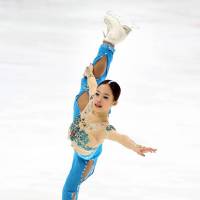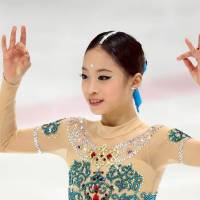History was made in Seoul on Sunday at the South Korean national championships when 11-year-old You Young won the senior women's singles competition.
You broke Yuna Kim's record in achieving the feat, with the legendary Kim having won the first of her six titles as a 12-year-old in 2003.
You, who is 11 years, 8 months old, landed seven triple jumps in her free skate and received level fours for her spins at Mokdong Ice Rink and posted a total score of 183.75 points. Included in her winning long program were triple lutz/triple toe loop and double axel/triple toe loop combinations.
You is so young (no pun intended) that she is not even eligible to skate in the world junior championships this year and won't be able to participate in the 2018 Pyeongchang Olympics in her home country. She would be skating in the novice division in Japan or the U.S. now due to her age.
Legendary skating writer Phil Hersh thinks You's ascendancy, along with the fact that the three of the top four finishers at the nationals were 12 or younger, is the product of Kim's influence.
"The Yuna Kim effect and inspiration beginning to take hold, apparently," Hersh tweeted on Sunday.
You, who stands 143 cm and weighs 31 kg, confirmed that this indeed was the case in comments following her victory.
"I repeatedly watched Kim Yuna's video clips and tried to learn from her," You was quoted as saying by the Dong-A Ilbo. "My biggest goal now is to make a successful triple axel."
The Chosun Ilbo reported that You began skating at the age of 6 while living in Singapore after watching Kim win the gold medal at the 2010 Vancouver Games.
"I never thought I would win it. Of course, I thought the gold medal would go to an older skater," You was quoted by the Chosun Ilbo. "I'm just so happy that I had a clean skate!"
As if winning wasn't enough of a thrill for You, her idol Kim took part in the medal presentation afterward.
"She is better than I was at her age," noted the 25-year-old Kim, according to the Chosun Ilbo. "I hope she works hard on the basics and takes care to avoid injuries."
Expert's view: Last week's Ice Time focused on the second-place finish by junior Wakaba Higuchi at the Japan nationals last month in Sapporo, where she made the podium for the second straight year.
An international judge provided additional insight on Higuchi's fine performance in Hokkaido, where she became the first Japanese junior woman since three-time world champion Mao Asada to make the podium at senior nationals twice.
"She is a strong skater with a lot of speed and triple jumps with flow," the judge noted. "But she still needs work on her presentation."
The judge believes the quality of Higuchi's skating will continue to improve.
"She is a junior age skater. I'm sure she will mature in the next few years. In skating you must have both sides."
The judge believes a high finish is in the cards for Higuchi at this season's world junior championships in Hungary in March.
"If she skates like she did at nationals at the world junior championships, she will be in the top tier. I'm looking forward to watching her career."
Hanyu's impact: U.S. champion Jason Brown, who won't be able to defend his title this month due to a back injury, recently gave Hersh his impression of Yuzuru Hanyu's record performances last month.
"He is really unbelievable," Brown said. "What he has done with the sport and what he does is absolutely incredible. I totally take my hat off to him. It's truly amazing. He is changing the sport, bringing it to new heights."
Hersh wrote that a Japanese reporter received the following reply from Brown when asking about Hanyu's effect on his fellow competitors.
"It is motivating," Brown said. "When one person jumps ahead, everyone is working harder, everyone is trying to take more risks. It's just another way to continue to bring our sport to new heights. I think it's awesome. I definitely don't look at it as discouraging or upsetting. I think it's only positive."
Mao mesmerizes: Mao skated an exhibition program called "Jupiter" at a special event sponsored and televised live by NHK in Morioka on Saturday to rave reviews. The program was inspired in part by the "Miracle Pine Tree" that was the only one of 70,000 trees in Iwate Prefecture to survive the 2011 Tohoku disaster.
The moving number began with a version of "I Vow to Thee, My Country" performed live by English boys choir Libera and showed Mao at her interpretative best.
The song was created in 1921 from a poem by Sir Cecil Spring Rice that was set to music by composer Gustav Holst. It was played most famously in recent times at the funeral of Princess Diana at Westminster Abbey in 1997.
One of Mao's exhibition programs during the 2011-12 season was set to the same music.
Back in the picture: Carolina Kostner, the 2012 world champion and 2014 Olympic bronze medalist, is eligible again for competition after being banned last January for her part in helping ex-boyfriend Alex Schwazer avoid a drug test.
Schwazer, an Italian race walker, was the gold medalist in the 50-km walk at the 2008 Beijing Games. He was given a 3½-year ban in April 2013 for a doping offense by the Italian Olympic Committee and then retired.
Costner is scheduled to take part in the invitational Medal Winners Open in Osaka on Friday along with former world champions Miki Ando, Yuka Sato, Kimmie Meissner and 2010 Olympic bronze medalist Joannie Rochette.
Carrying on: Hersh, who retired from the Chicago Tribune in November after 31 years traveling the globe to cover both the Winter and Summer Olympics, has pledged to continue covering skating and other Olympic sports.
This month Hersh launched his own website: www.globetrottingbyphiliphersh.com
Hersh's interesting insights and unparalleled contacts in the business will make the site a must read for those who follow skating and the Olympics closely.




















With your current subscription plan you can comment on stories. However, before writing your first comment, please create a display name in the Profile section of your subscriber account page.